IRGC-Linked Conference Exposes Regime’s Attempted Infiltration In UK
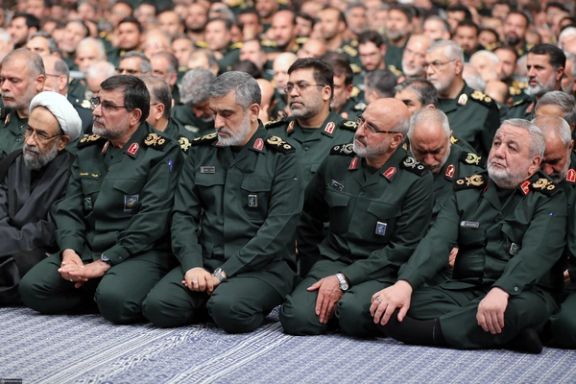
Through an IRGC-linked research conference, Iranian hardliners are attempting to infiltrate the UK through university academics.

Through an IRGC-linked research conference, Iranian hardliners are attempting to infiltrate the UK through university academics.
The International Conference of Research in Europe (ICRE), an annual event that began last year has drawn over 300 participants including UK professors from Cambridge, Birmingham and Glasgow Caledonian University.
The ICRE conference director Mohammad Hussain Ataee Dolatabadi is affiliated with the highest security intelligence circles of the regime. In January 2023, Supreme Leader Ayatollah Ali Khamenei praised Dolatabadi, a British citizen for organizing ICRE and Abadi has boasted to IRGC-affiliated sources about the conference and its global academic attendees, who can bolster the regime with critical information in the field of science and technologies.
However, after it was revealed in the British media that Dolatabadi has hosted senior IRGC commanders through his position as head of the ‘Islamic Students Association of Britain’ and ‘Union for Islamic Students Association of Europe’, organizers tried to erase evidence of the conference including its website.
ICRE's formal association with these two student associations, recently exposed for online meetings with senior IRGC officials, indicate deep connections between the conference and the regime's highest security-intelligence circles.
Mohammad Marandi, an adviser to the regime's nuclear negotiating team, is part of ICRE's Scientific Committee and Hadi Larijani, with close ties to the regime's leadership, also played a key role in organizing the conferences.
As the IRGC's targeting of the UK increases, so do calls for immediate action. Critics are demanding that the government immediately proscribe the IRGC as well as investigate the presence and citizenship of Iranian regime elites and oligarchs within the UK.
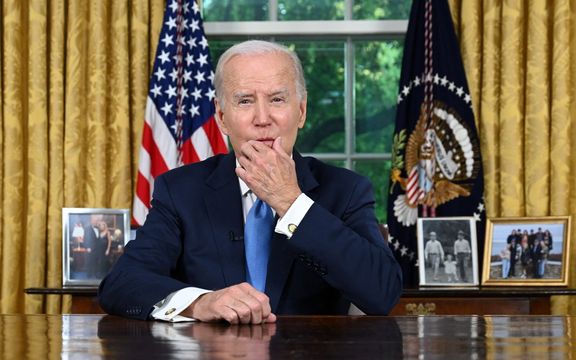
Fallout from the latest US ‘unwritten deal’ with Iran to free US hostages and potentially reshape the nuclear agreement, continues to impact the Biden administration at home and abroad.
Criticism has been coming thick and fast as the State Department continues to deny any sort of update of “nuclear understanding”
Republican Senator Bill Hagerty slammed the secrecy surrounding the latest talks which saw at least $6b in frozen Iranian funds freed up in South Korea and handed to Qatar to manage, in exchange for five dual citizen hostages, as “a Biden family business deal”.
Demanding transparency, he said: “Follow the law by writing these understandings down and sharing them with Congress”, referring to the fact the administration has skirted the legislation to protect any changes being made to the Iran Nuclear Agreement Review Act which requires President Biden to notify Congress of any agreement with Iran related to its nuclear program.
Meanwhile, Secretary of State Antony J. Blinken met with Israeli Minister for Strategic Affairs Ron Dermer on Thursday in Washington, Iran one of the key elements of the talks, including the formation of a ‘limited defense treaty’.
Reports about a potential treaty have been mooted many times in the past, as recently as 2019. This issue died down only to resurface now while being pushed by Dermer, who has not hidden his support for such a treaty for more than a decade.
But, now the talks might become more serious, connected to a possible comprehensive US-Saudi deal, involving Israel and a potential normalization between Israel and the kingdom.
In a press release, the State Department confirmed talks delved into “cooperation on regional challenges, including threats posed by Iran and its regional proxies in Lebanon and elsewhere”, in addition to ongoing discussions about further normalization deals across the region.
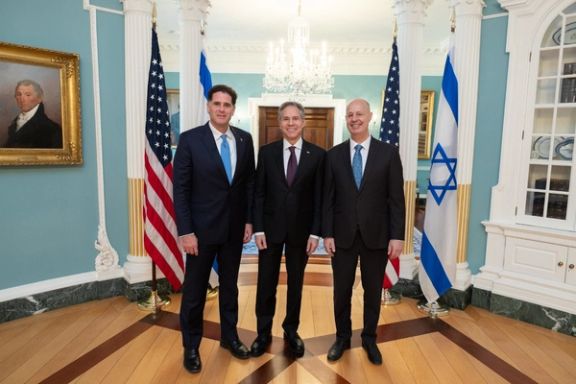
Talks to normalize with Saudi Arabia have also come under fire as the implications to Israel’s position regarding its arch-enemy Iran remain at the heart of talks. Jacob Nagel, who previously served as Israeli Prime Minister Benjamin Netanyahu's national security advisor and head of the National Security Council warned that “a limited defense treaty between the US and Israel as part of a normalization agreement with Saudi Arabia and a trilateral agreement between the US, Saudi Arabia, and Israel, contains much more cons than pros”.
Writing in Israel Hayom, he said this was especially critical when it might come at the expense of Israel's top priority concern: preventing a bad Iran nuclear deal that will lead Iran on its sure path to a bomb in a very short timeframe.
For the US, there is a wide-reaching ripple effect of the talks, suggesting there is more on the table than merely hostages and Iran’s nuclear program. According to The New Arab, Iran has sent General Esmail Qaani, the commander of Iran's Quds Force, for secret talks in Iraq this week in a bid to soften tensions with the US and urge a halt to military action against US forces in Iraq.
The US’ years-long shadow war has seen more than 80 attacks on its facilities in Iraq and Syria with multiple casualties and fatalities among them, and just five retaliations by the US.
As calls for transparency continue to ring loud for the Biden administration, the acting US envoy to Iran remains silent, and the State Department continues to gaslight questions. In its latest press briefing, spokesman Vedant Patel reiterated earlier lines about remaining tough on Iran, claiming the US “will continue to take steps to hold the Iranian regime accountable for their malign, destabilizing activities in the region, as well as more broadly as well”.
Talks behind the scenes remain unclear, but what is clear is regional changes are afoot.
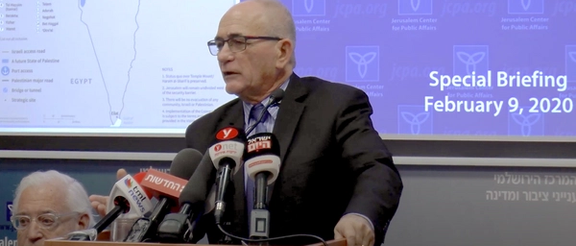
A leading Israeli security expert has told Iran International that Khamenei’s regime will use the $6 billion hostage payment to “suppress the Iranian people.”
As part of a secretive deal reached with Iran’s regime, the Biden administration will funnel $6 billion in sanctioned oil revenue to Tehran in exchange for the release of five unjustly detained Americans. The US government will also free jailed Iranians as part of the controversial deal.
Gen. (Res.) Yossi Kuperwasser, now a senior researcher at the Israeli Defense Security Forum, said “Money is fungible” and added the amount of money that will be sent to Iran is, according to media reports, more than $6 billion.
The Islamic Republic “can use the money to fund terrorist proxies and armaments,” said Kuperwasser, who was the former head of the Research Division at the Israel Defense Forces Intelligence Corps.
He noted the hostage payment deal is “acquiescence to the Iranian policy of kidnapping to force the International community to do what it wants.”
Kuperwasser cited the example of the clerical regime seizing the Belgian aid worker Oliver Vandecasteele as a hostage. The Belgium government released the convicted Iranian terrorist Assadollah Asadi in exchange for Vandecasteele.
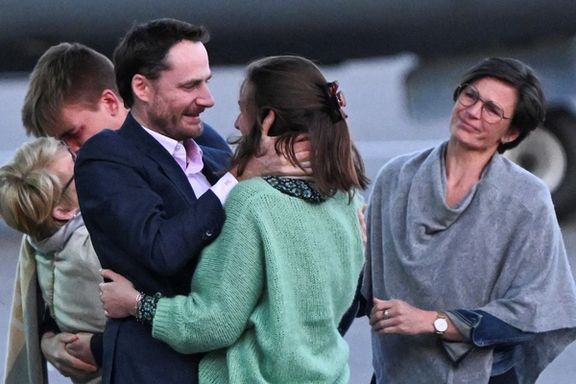
He said the current deal is “another sign to accept the malign behavior of the Iranian regime. The IRGC has not yet been proscribed as a terrorist organization by the Europeans and the United Kingdom.” Kuperwasser, who was also the Director General of the Ministry of Strategic Affairs, said the Western countries “are not doing anything to enrage the mullah regime.”
He continued that “This is a dangerous situation. The international community allows Iran to be a [nuclear] threshold state.” Kuperwasser outlined the three pre-conditions for Iran’s atomic weapons program.
He said,“the fissile material is there” for Iran’s nuclear weapons program and the “delivery system is basically there,” adding that only “The weaponization is missing.” Iran has amassed enough enriched uranium for at least two nuclear weapons, experts say.
Kuperwasser said against the backdrop of the astonishingly fast progress Iran’s regime has made with respect to its nuclear weapons program, the hostage payment deal worries the Israeli security establishment.
He noted that Israel’s prime minister Benjamin Netanyahu issued a statement about the hostage agreement, in which he scorned the deal that will pump $6 billon into the coffers of the clerical regime. Netanyahu said Israel’s policy against the Iranian regime will not be sidelined by Biden’s efforts to reach a new nuclear deal with Tehran.
Iran International reported in June that European intelligence agencies issued a batch of reports, documenting Iran’s attempts to obtain nuclear weapons technology in 2022. According to the Netherlands General and Intelligence Security Service (AVID), the Islamic Republic’s highly advanced and fast-moving enrichment of weapons-grade uranium “brings the option of a passible Iranian first nuclear test closer.” The Middle East Media Research Institute (MEMRI) first located and translated the European intelligence documents.
Last week, Iran International reported that critics of Biden’s new deal to free American hostages say it will only emboldens the Iranian regime’s hostage-taking policy.
Kupperwasser said in October more sanctions will be lifted on Iran’s regime at the UN. Ballistic missile sanctions imposed on Iran in a 2015 UN resolution will expire on October 18.
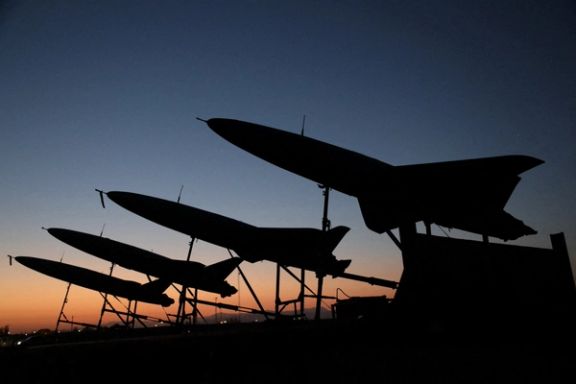
Russia is making significant strides in the mass production of an Iranian-designed attack drone, capable of targeting Ukrainian urban areas from over 1,000 miles away.
According to a report in the Washington Post, leaked documents from an insider within the Russian Republic of Tatarstan's Alabuga Special Economic Zone, indicate that, despite delays and a production process that affected by sanctions affecting essential components, Moscow has made steady progress toward its goal of manufacturing the Iranian Shahed-136, an attack drone capable of traveling more than 1,000 miles.
The source, opposing Russia's military involvement in Ukraine, also shed light on the complexity of the situation. Iran acknowledges supplying drones to Russia but insists these transactions occurred prior to Russia's February 2022 invasion of Ukraine.
While Russia had initially denied deploying Iranian drones in Ukraine, President Vladimir Putin supports expanding domestic drone production, envisioning an industry value exceeding $20 billion. Russian officials are yet to respond to the Washington Post's findings.
The report also asserts that Russia has built an autonomous drone production facility in the Tatarstan region, 500 miles east of Moscow, with plans to manufacture around 6,000 drones by mid-2025. Engineers at the facility are working on enhancing the Iranian drone's design, aiming for larger-scale production and improved quality. They are also exploring capabilities for coordinated "swarm attacks." Spanning from winter 2022 to spring 2023, the documents encompass blueprints, schematics, and crucial details, some of which were previously reported by the Russian news outlet Protokol.
In response, Washington has imposed sanctions on Russia and Iran, targeting key figures within a defense firm associated with drone supply to Russia. Several entities and individuals engaged in drone-related activities are also subject to sanctions.
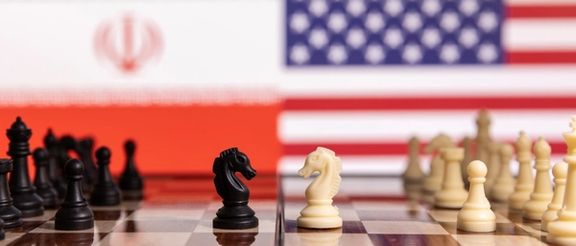
A former Iranian diplomat says media speculations about the Iran-US prisoner swap deal being part of a wider agreement seems to be a rumor.
Iranian media and some observers on both sides say domestic politics in both countries can affect the deal's fate.
Qasem Mohebali, told Didban Iran [Iran Monitor] website that any permanent and official deal between Iran and the United States is unlikely before the US presidential elections.
Asked whether Iran deserved an "oil for food" deal, Mohebali said, "Iranian officials should have thought of this before their policies led to its nuclear case being referred to the UN Security Council.
Iran has effectively lost its political and financial independence after its nuclear case was handed over to United Nations Security Council, he said, and a series of resolutions were issued against it (2006-2012). Mohebali argued that at the present time also Iran has little control over its international economic and financial transactions, as other states decide what it can have and to what extent.
As regards possible links between the prisoner swap and nuclear negotiations, Mohebali said these are two different issues. The prisoner swap is important for the United States from a humanitarian perspective and Iran is interested in repatriating its money. But the nuclear negotiations must be discussed within a different context.
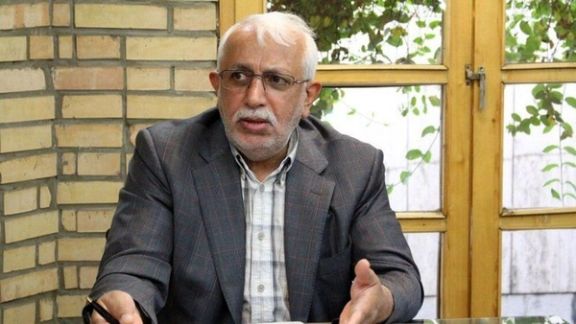
He added that the prisoner swap will be a positive point for US President Joe Biden and other US Democrats although there is still a long way before the elections. Iran and the United States have many different matters to discuss, the former diplomat pointed out, including the nuclear issue, the Middle east, human rights, missile development, terrorism and most recently Iran's contribution to Russia's war against Ukraine. Every single one of these issues should be dealt with separately, a package deal involving all of them looks is not very likely.
Mohebali added, it is unlikely that Iran and the United States start negotiations about these matters before 2025 after the US elections. Iran is not certain about the policies of the next administration and is not certain if it will stand by an agreement with the Biden Administration.
"What US government is currently doing is helping innocent individuals to get out of prison. However, its political rivals might question the payments made during the swap. At the same time, others accuse the US of taking Iran's assets hostage. Still others might ask whether the prisoners to be released are Iranians or US citizens," Mohebali explained.
Meanwhile, in an article about what might go wrong in a deal between Iran and the US, proreform website Fararu wrote: "The test agreement to secure the release of Iran's assets and the freedom of prisoners in the two countries might come across problems and its entirety could come under a shadow of doubt during the weeks before it is finalized."
The website argued that despite the apparent diplomatic victory, it is still too early to be optimistic about the deal. One of the hindrances might be the deployment of US Marines to oversee shipping along the Strait of Hormuz.
Referring to Qatar's role in forging the Iran-US deal, Fararu wrote that Doha does not want to see any tension between Iran and the United States. Nonetheless, despite Qatar's help, there is still the danger of a conflict between Iran and Washington in the volatile Persian Gulf.
According to Fararu, at the same time, domestic politics both in Iran and the United States can make matters complicated. The Biden Administration has already been accused by some US lawmakers and others of bribing the Islamic Republic. In an August 14 tweet, Holly Dagres, a senior fellow at the Atlantic Council wrote that she told AFP: "if a hostage deal is implemented around the Mahsa Amini protests anniversary, it'll be a win for the clerical establishment. Doing a deal with the United States around such a sensitive period is, in essence, communicating to protesters that Washington doesn't care about their plight.”
Meanwhile, United Against of Nuclear Iran (UANI) on the same date quoted the White House Spokesman as having said that "Iran will only be able to use the $6 billion [released by South Korea] for “humanitarian purposes.” However, UANI asked: “In a competition for the funds between the Islamic Revolutionary Guard Corps and the public health of the Iranian people, who do you think wins?”
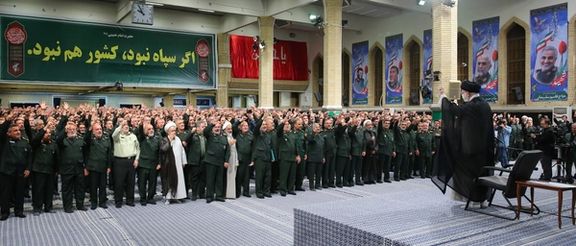
Iran’s ruler Ali Khamenei has praised the Revolutionary Guard while their loyalty and power to quash dissent will be put to test once again during possible protests.
In a meeting with a group of senior IRGC officers and Basij paramilitary leaders on Thursday, Khamenei described the Revolutionary Guard as “the largest counter-terrorist organization in the world,” while international calls to designate the group as a terrorist outfit have been echoing across the political landscape of many countries.
Reacting to Khamenei’s flattering words, hundreds of Iranians rushed to social media to point out that the statement is accurate as long as the prefix “counter or anti” is removed from the word terrorist.
Washington designated the IRGC as a foreign terrorist group in 2019 and US lawmakers have made repeated calls to their allies to prioritize designating the group as such. In May, a bipartisan group of US congresspeople sent letters to the heads of US-allied nations -- the UK, Australia, Canada, and India – to reiterate calls to swiftly act and officially sanction the IRGC in its entirety.
Despite numerous pleas by politicians, diplomats, opposition leaders and activists, the UK and EU are still hesitant to proscribe the entity, which has proved to be the most destabilizing element in the Middle East region and a big threat to American and European citizens in the world, as well as the main suppression force in Iran.
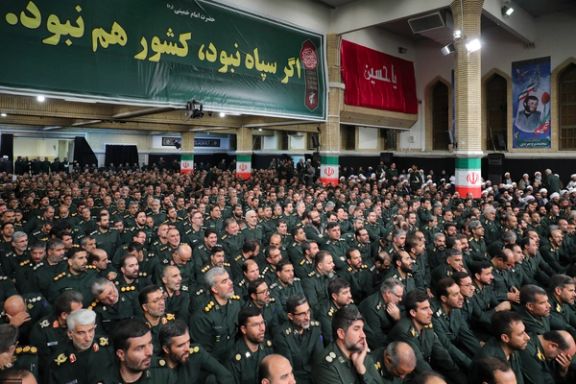
During the meeting with his most important base of support, Khamenei warned of attempts to besmirch the IRGC and Basij forces, saying, "One of the important aspects of the enemy's activities is tarnishing the image of the IRGC. and the Basij; why? Because the Guard is awe-inspiring, the Basij is impressive, which makes them worried and anxious."
Elsewhere in his remarks, Khamenei emphasized that the US is the main enemy of the regime, saying that one of the past mistakes was not recognizing the US as ‘the enemy.’ “We must raise our voice against America,” he said.
The blandishment by the Supreme Leader came as many Iranians are planning to hold anti-regime protests to mark the anniversary of the Women, Life, Liberty movement, Iran’s biggest popular uprising sparked by the death in custody of 22-year-old Mahsa Amini in mid-September.
Khamenei depends on the IRGC and Basij to defend the main bastion of the regime as he cannot trust the traditional Army, which has been kept weak. However, minutes of a meeting of senior clerics and IRGC commanders with Khamenei, leaked to the media in March, indicated the negative impact of the protests on the morale of forces under the command of the IRGC and their burn-out, with several offering anecdotal accounts of insubordination.
“It is a well-equipped military organization. It is an efficient and independent organization capable of carrying out tasks that many of the world's major militaries cannot accomplish,” Khamenei stated during the Thursday meeting with the Supreme Assembly of Commanders of the IRGC.
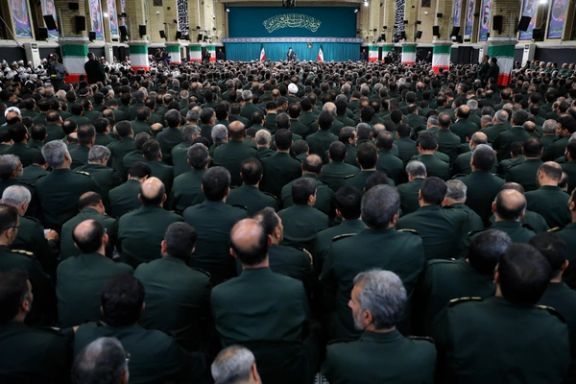
IRGC’s extraterritorial Quds force leads activities of regime’s proxy forces against the United States, Israel, and other adversaries in the region and beyond. The IRGC is providing drones and missiles for the Russian invasion of Ukraine, and is also involved in assassinations, kidnappings and cyberespionage operations across the globe.
The outfit is also behind drugs and arms trafficking and money-laundering and other cases of economic corruption both in Iran and abroad. The IRGC is also the main force to suppress any critical voice in Iran with its members unofficially exempt from due process in case of wrongdoing and corruption.
Over 500 Iranians have been killed by security forces, mainly consisting of the IRGC and its Basij militia, during the crackdown on the last year protests, which may resume throughout Iran in the coming weeks.
Numerous politicians across France, Germany, the UK, and other European nations are eager to push for the designation of the IRGC, asserting that it has been significantly delayed. Resolutions have also been adopted in their respective parliamentary bodies, underscoring the pressing need for the IRGC's designation. However, both UK and European governments perceive this step as a potential impediment to diplomatic engagement with the Tehran regime.